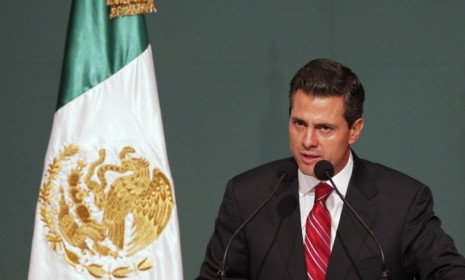Can Mexico's new president end the drug wars?
Mexico elects Enrique Peña Nieto as its new leader, rejecting the ruling party in part because of its inability to end a bloody conflict with the drug cartels

A free daily email with the biggest news stories of the day – and the best features from TheWeek.com
You are now subscribed
Your newsletter sign-up was successful
Mexicans handed their nation's presidency back to the Institutional Revolutionary Party (PRI) on Sunday, after 12 years of democracy-building governance by the conservative National Action Party (PAN). The PRI's telegenic Enrique Peña Nieto beat his two main challengers, the PAN's Josefina Vázquez Mota and leftist Andrés Manuel López Obrador, thanks largely to public dissatisfaction with economic inequality and, notably, outgoing President Felipe Calderón's bloody war against drug cartels. The PRI, which dominated Mexico with seven decades of authoritarian rule before the PAN took over, was known for relatively peaceful coexistence with Mexico's cartels, a past Peña Nieto distanced himself from during the campaign. "There will be no deals or truce with organized crime," he said in his victory speech Sunday night. Can Peña Nieto stanch the flow of cartel-spilled blood that has plagued Mexico over the past several years? Here's what you should know:
First off, who is Peña Nieto?
A former governor of Mexico state, the 46-year-old Peña Nieto is known more for public works projects than ideology. But "attractive, charismatic, and married to a glamorous television star, [he] fits the role of president as if cast by a Hollywood agent," says Erika Angulo at NBC Latino. His wife is popular telenovela star Angelica Rivera, and Peña Nieto "has a certain connection with people, particularly with women," former Mexican foreign minister Jorge Castañeda tells NBC News.
The Week
Escape your echo chamber. Get the facts behind the news, plus analysis from multiple perspectives.

Sign up for The Week's Free Newsletters
From our morning news briefing to a weekly Good News Newsletter, get the best of The Week delivered directly to your inbox.
From our morning news briefing to a weekly Good News Newsletter, get the best of The Week delivered directly to your inbox.
And what's going on with Mexico's drug war?
In 2006, Calderón took office promising to crack down on the drug cartels. He did, sending the military to help or replace inept or corrupt local police forces. The plan has notched some successes, like nabbing a few high-profile drug kingpins, but has also led to a sharp escalation in violence. At least 55,000 Mexicans have died, some in very publicly gruesome ways, including decapitation and hanging. In a recent Pew survey, about 80 percent of Mexicans approved of sending in the military, but fewer than half think it's working, and about a third say the government is losing ground. On top of that, "the economic improvements Calderón promised haven't materialized, largely because the violence has scared away tourists and investors," says the Chicago Tribune in an editorial. It's no wonder voters are ready for another approach.
What is Peña Nieto's plan?
He barely mentioned drug violence during the campaign, running instead as a pragmatic manager who would create jobs and raise standards of living for Mexico's poor and middle class. But he has generally pledged to prioritize reducing drug-related violence instead of arresting drug lords, pull the military off the streets in favor of a new, civilian-led paramilitary police force, and concentrate his efforts on the hardest-hit areas. In mid-June, Peña Nieto hired Óscar Naranjo, a retiring Colombian police chief with experience combatting drug cartels, as an adviser, promising "immediate results" in reducing violence. "The impression that conveys to the voters (quite intentionally) is that as president he will make peace with the cartels, not wage a hopeless war against them," says Gwynne Dyer in The Japan Times.
A free daily email with the biggest news stories of the day – and the best features from TheWeek.com
Is this a return to the "bad old days"?
"It's probably a bit more complicated than that," says Dyer. Mexico has changed, and the PRI is no longer in control of everything, so we probably won't see a return of the "grubby arrangement" in which PRI officials let the cartels discreetly fight their wars and do their business, with just the "occasional big drug bust to keep the Americans happy." Still, if Peña Nieto does go this route, "would this be such a terrible thing for Mexico?" After all, during PRI's reign, "not many people got killed and the public slept easily." Paradoxically, the introduction of democracy in recent years strengthened the drug gangs, says Enrique Krauze in The Washington Post. In the bad old days, the PRI "could combat criminal violence through harshly authoritarian means not acceptable or possible in a democracy."
What does this mean for U.S.-Mexico diplomacy?
Make no mistake: "The PRI's reputation for corruption and history of tolerance for politicians suspected of working with organized crime" is a big challenge for U.S. officials who enjoyed close ties with Calderón's anti-drug team, says Pamela K. Starr at Foreign Affairs. The U.S. and Peña Nieto's administration will cooperate, once a base level of trust is established, but it won't be the same: A shift in Mexican priorities toward stemming violence instead of seizing drugs "is what the Mexican population demands," but the U.S. won't like it.
Sources: BBC News, Chicago Tribune, Daily Beast, Foreign Affairs, Japan Times, NBC Latino, New York Times, Toronto Star, Washington Post (2)